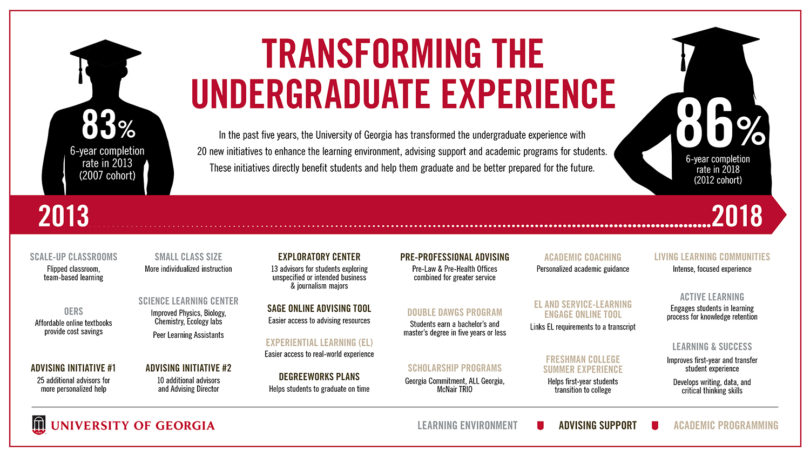When President Jere W. Morehead took the helm of the University of Georgia in 2013, he seized the opportunity to enhance the learning environment even further for the university’s undergraduate students. Since then, the university has rolled out a series of student success initiatives and made dozens of critical improvements to programs.
The impact has been dramatic.
Over the past five years, UGA’s six-year completion rate has increased from 83% to 86%. This increase can be attributed, in part, to innovative changes in the undergraduate experience, from new academic support programs, to hands-on and active learning opportunities, to future-facing technology and classrooms.
“Working together, we are transforming the learning environment and changing the lives of our students,” Morehead said. “We are proving that the future of public higher education in America is being molded right here, where it began, at the University of Georgia.”
The impact of these initiatives has fostered an engaging academic environment that combines critical thinking with real-world experience, giving UGA graduates a competitive edge once they enter the workforce.
Advising additions
At the frontlines of undergraduate success, UGA’s academic advisors offer critical guidance for students to navigate their college experience. In 2015, UGA Office of Instruction administrators noticed that many students pursue double majors, as well as minors and certificates, across a wide variety of university departments. After hiring 35 additional advisors, appointing an advising director and streamlining the advising model across campus, students are better able to access the majors, courses and certificates they need.
UGA opened The Exploratory Center in 2016 for students to experiment with their intended majors, and the center’s 13 advisors have already held more than 24,000 meetings with individual students. For those interested in particular careers, the new Pre-Professional Advising Office now supports pre-law and pre-health majors. In addition, the Student Advising and Guidance Expert (SAGE) software provides easier access to resources for advisors, and the web-based DegreeWorks tool allows students and advisors to monitor degree requirements and course credits.
“Our ultimate goal is for students to graduate in a timely manner while fitting in their goals and interests across our more than 300 majors, minors and certificates,” said Rahul Shrivastav, vice president for instruction. “A positive advising experience can focus on these opportunities and help students achieve the track they want.”
Experiential learning for all
Experience-based learning opportunities also have been emphasized. Because successful leaders require innovative thinking and problem-solving skills, UGA now ensures that every student is able to participate in learning outside of the classroom through its experiential learning requirement.
To increase experiential opportunities, faculty committees developed rubrics for their own departments, implementing experiential aspects across campus with investments in technology and databases to track best practices. Since the summer of 2016, more than 42,000 students have completed study abroad, research, service, leadership and internship programs, supported by a total of $571,500 in scholarships. The overall experiential learning initiative continues to evolve and improve as UGA officials evaluate the options every six months, looking for new ways to build partnerships both on and off campus to provide real-world experience for students.
“Our student quality is ever-increasing, and instead of focusing on graduation rates, we wanted to provide enriching experiences that would help students to start higher on the career ladder, move up sooner and take on leadership roles in whatever area they wanted to pursue,” said William Vencill, associate vice president for instruction.
Growth in academic support
Inside and outside of the classroom, new academic support initiatives, such as scholarships and peer coaching, have sought to close equity gaps created by socioeconomic status, ethnicity and first-generation college student status. The Georgia Commitment, ALL Georgia and McNair TRIO scholarships offer students the opportunity to participate in otherwise inaccessible academic programs.
In addition, faculty and staff alike have focused on the overall undergraduate experience and the importance of auxiliary services that enrich learning. Classrooms have been updated, professors are attending new training, and conversations are focused on what the university should do in the next five years to boost student experiences with extracurricular activities, housing, dining, transportation, recreation, health care and mental health services.
“Learning doesn’t happen in the classroom alone,” Vencill added. “We’re committed to the overall experience of making this a cohesive place for student learning.”








